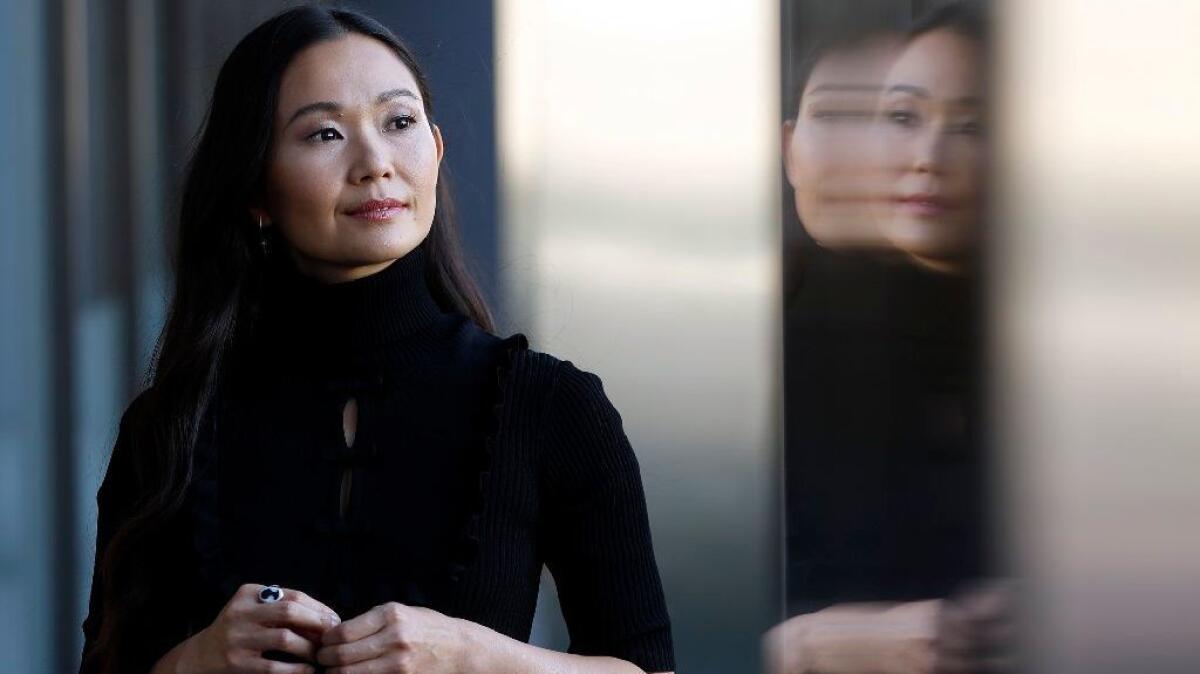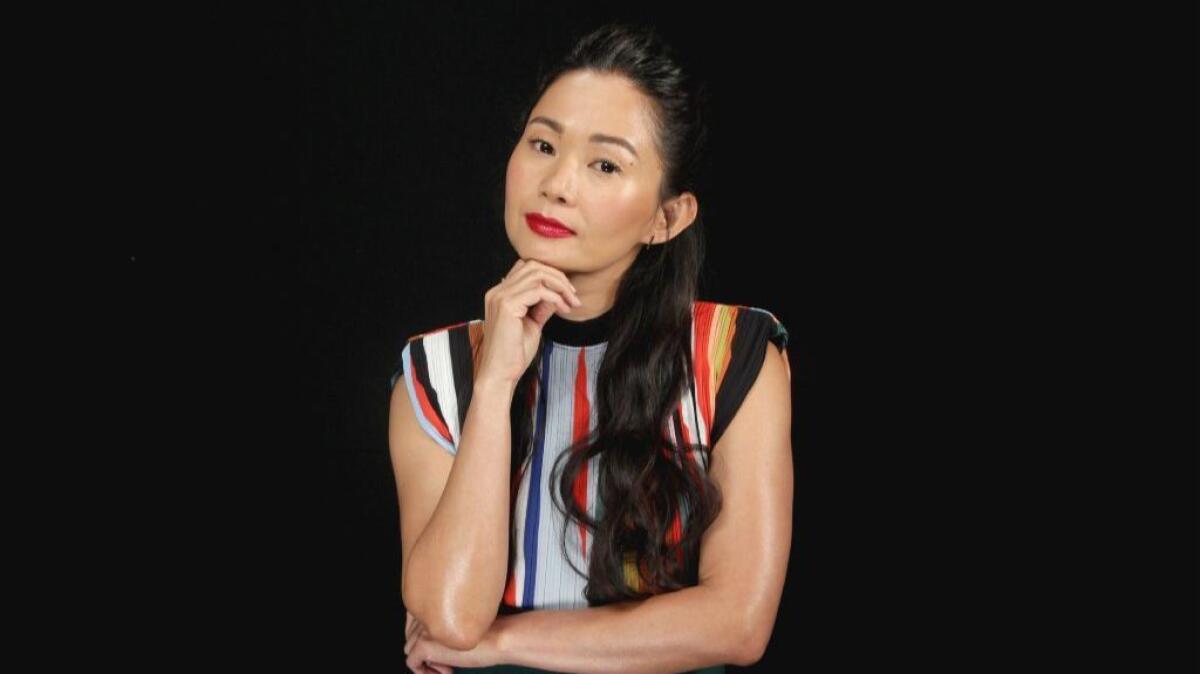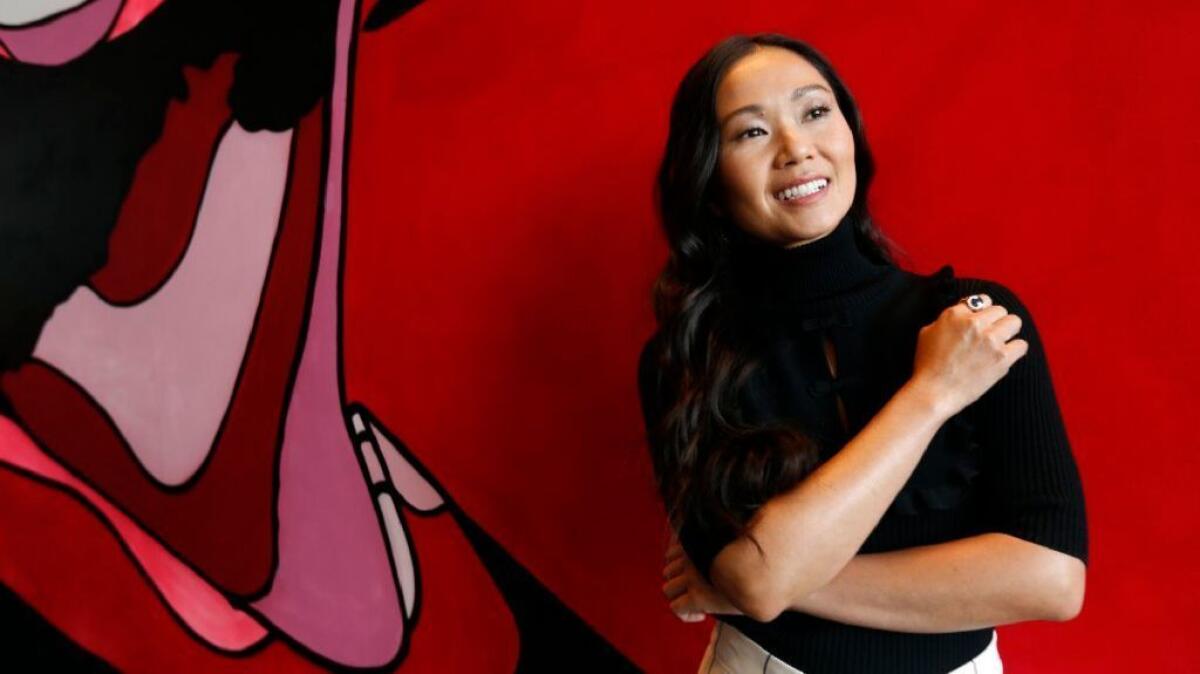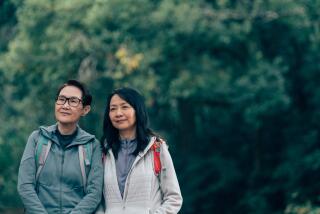Playing an Asian activist with a disability in ‘Downsizing,’ Hong Chau hopes to see more diversity in films

- Share via
“It’s a small world but not if you have to clean it.” That adage, from the work of artist Barbara Kruger, could describe “Downsizing.” In Alexander Payne’s new film, opening Friday, people volunteer to shrink themselves down to five inches tall in order to save the planet from humanity’s worst excesses, and also -- in the U.S. at least -- to get a bigger bang for their buck. Paul Safranek, played by Matt Damon, does just that, ending up in Leisureland, a world of big little mansions and normal-sized greed. But even in this ostensibly ideal environment, somebody has to do the dirty work.
Actress Hong Chau plays Ngoc Lan Tran, a Vietnamese dissident who was forced to shrink against her will. She escaped her country, lost a leg in the perilous journey, and now finds herself with a bad prosthetic and a worse job — as a maid for the petite and petty rich folks of Leisureland.
Ngoc Lan’s own living conditions are squalid, as are those of hundreds of laborers warehoused all around her, doing the jobs nobody else notices. She spends her free time trying to help those folks with food and medical care. When she meets Paul Safranek (Matt Damon) and learns that he is a physical therapist, she insists he come with her to make the rounds, the closest thing to a doctor these working poor will ever see.
WATCH: Video Q&A’s from this season’s hottest contenders »
As selfless as Ngoc Lan is, she is no saint. She is loud, demanding and relentless. “It’s so nice to play a character like this, who is a brave and selfless person, but is still very complicated and complex and multifaceted,” Chau says. “Sometimes with characters who are martyrs, it can be a little bit reductive and simplistic, and not emotional, and doesn’t touch you in the way that this character does.”
Growing up, Chau was surrounded by people in her family and community who were driven by necessity, not unlike her character. “When you see something that needs to be done, you do it.” She was born in a Thai refugee camp after her parents fled Vietnam in 1979. A family in New Orleans then sponsored her family to move there.
“We were refugees, we needed public assistance, I went to public school and I needed lunch assistance, I needed Pell grants to go to college, and I worked at PBS my first job out of college,” she says. “So it’s wild, I feel like I’m the personification of all of these things that we’re seeing in the news right now. And so is “Downsizing.” As a film, it touches upon climate change and consumerism and immigration and all of these things.”

Chau is 5-foot-1 and has “a tiny baby voice” as she puts it, so that talking with her in the lobby of a Hollywood PR company means leaning in very close. She only started taking acting classes in college to try to counter her shyness. “Usually, I get asked to be a little bit sweeter, more adorable, and Alexander asked me to not be any of those things.”
She calls Ngoc Lan the kind of role that’s long been missing in cinema. “I didn’t think anybody would crack how to do this character in a way that was authentic, but also still enjoyable and not problematic in being a caricature or being offensive,” she says. “We have seen glimpses of this character but only in the background, so to give a character like this the screen time and the attention and the complexity is what I have been waiting for, as not just an actor, but as a person who loves film.”
She notes that actors often exult about getting to act “with their whole body. But for me, I got to act with my whole body and my whole face, because usually for female characters, especially if you’re a love interest, there’s a certain placidity that takes place, and I don’t get it, I don’t understand it, because in life, we make a lot of faces.”
Chau learned how to portray a woman who lost her leg by working with an amputee consultant, going to her rehabilitation center to learn how to move correctly. “I think one in five Americans has a disability of some sort. That’s 20% of the population, and yet we rarely ever see people with disabilities on-screen, and their stories and their resilience and their zest for life and their humor and their humanity.
“So I hope that, in addition to people seeing this role and being inspired that she’s an Asian woman, they’re also inspired that she’s a person with a disability, and I hope that inspires them to write more stories.”

More to Read
From the Oscars to the Emmys.
Get the Envelope newsletter for exclusive awards season coverage, behind-the-scenes stories from the Envelope podcast and columnist Glenn Whipp’s must-read analysis.
You may occasionally receive promotional content from the Los Angeles Times.






